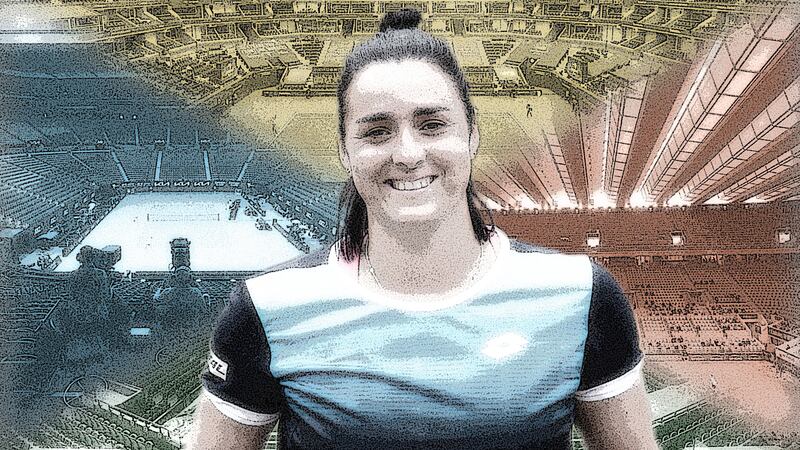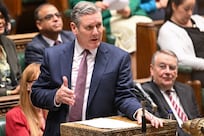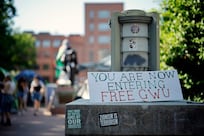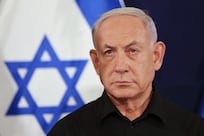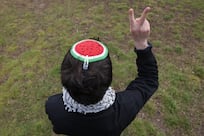If there was ever a season to celebrate the rising profile of tennis in the Middle East, it would be this one. I am feeling it on a personal level. But it is clearly happening more widely, too.
This week was very special for me because I get to compete on home soil at the Jasmin Open ― the first WTA tournament to be staged in Tunisia.
It is amazing to have such an event in my country. So many people, children and adults, have been dreaming of seeing me play in Tunisia. The fact that I am here and that my countrymen and women can see me live is an opportunity to inspire all, particularly the new generation, who should believe that they too can one day be in my position, on tour as Tunisians and playing in major tournaments.
It is also, of course, a great moment to project a positive image of Tunisia to the world. Sport has an almost unique power to inspire in both such a personal and large-scale way.
It is not easy, as my career, and the career of all athletes, show. But many of the deeper rewards are still there, in defeat as much as in victory. A couple of weeks ago I lost the US Open final to Iga Swiatek. While it might seem like a sad moment, believe it or not, I have not really had the time to reflect on what I achieved at the Grand Slams this season. Instead, I’ve just been focused on Tunisia’s tournament and its significance for the country and the region.
Nonetheless, it has been a busy year. I still cannot believe that I reached two Grand Slam finals in a row, at Wimbledon and in New York. Now there is another big tournament coming up, the WTA Finals, which is going to be my next big focus. I can certainly say I’m a little bit tired. It is the end of the season and I can really feel it. The most important thing for me is to rest after those big tournaments and not feel drained, especially emotionally, because international tennis takes a lot out of you in that regard.
It is important to give myself a chance to celebrate. And while focus needs to be maintained, being surrounded by my family here at the Jasmin Open is a good chance to reflect on the deeper sporting significance of this year.
I get asked a lot about my legacy and how I feel about the impact I’ve had so far on Arab sport. I don’t want to get caught up in that kind of competitiveness with other players. I just want us, as players in the region, to be united in general and to push each other to do better, wishing each other the best results possible.
I am trying to do my bit, in particular by giving hope and inspiration to as many players as possible. Nonetheless, it is a huge task, the extent of which I still cannot fully comprehend. In only one week I have been overwhelmed at the number of young and talented players here in Tunisia who come up to me to speak about their goals and ambitions.
This surge of enthusiasm in the region is not just reserved for tennis players. Recently, Moroccan golfer Ines Laklalech, who last month became the first Arab or North African to win a title on the Ladies European Tour, reached out to thank me for being an inspiration to her. It was a touching moment. I had not fully appreciated that tennis could help people in other sports, too. Apparently there are only two Moroccan women playing golf on the LET, and one of them texted me. It gives me extra motivation to do more.
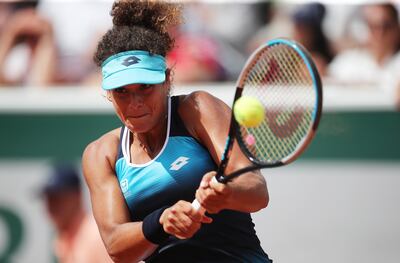
I was also very happy to see Egypt’s Mayar Sherif winning her first WTA title this month in Parma. It was amazing to see her overcome the odds, not least in terms of her recent tough injury. Hopefully she can join the effort to encourage more players from Egypt and the region. Her country is already a remarkably successful centre of squash internationally.
Back in the world of tennis, it is amazing to have two Arab women ranked in the top 50 in the WTA. It is reminiscent of the “Three Musketeers”, the Moroccan trio of Hicham Arazi, Karim Alami and Younes El Aynaoui, who excelled in the men’s tennis tour; so it’s nice to see the women now at the forefront.
It is worth mentioning that the UAE is playing an important role in encouraging sporting success in the region. After the US Open last month, I was delighted to learn that I was named Arab Sports Personality of the Year at the Fatima bint Mubarak Women Sports Awards in Abu Dhabi. I feel at home in Abu Dhabi and have a strong connection to it, a reason that I am so happy to be coming back one more time to play the Mubadala World Tennis Championship next December.
I would say I even feel spoilt in the city. Last year, even though I was a last-minute replacement for Emma Raducanu, a supportive crowd showed up and people were really cheering me on. I think that was one of the first occasions that I started to recognise quite how big is the impact that I am having on the Arab world and its sport. This time round, with more notice that I am coming, I am hoping for a full stadium.
I think my biggest goal for 2023 is to win a Grand Slam and become world number one. But whether or not this happens, there is always the inspiring and crucial side story of promoting sport in the region, one in which I am proud to be a key character.
